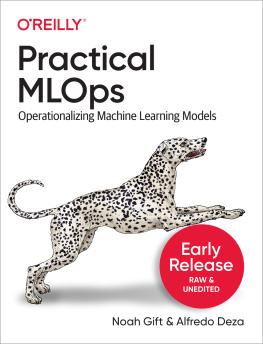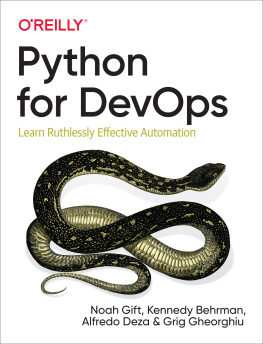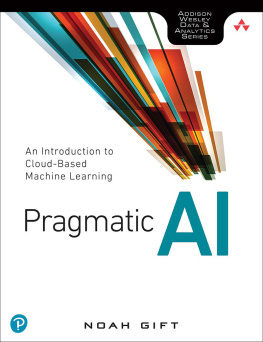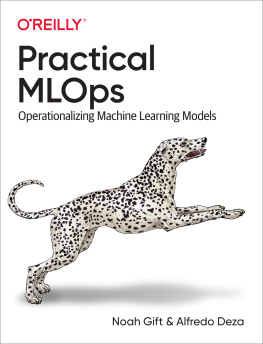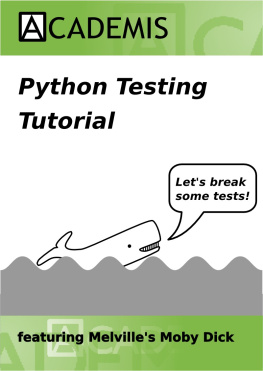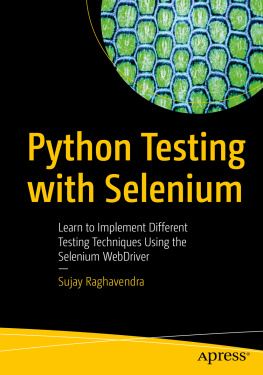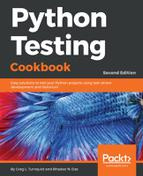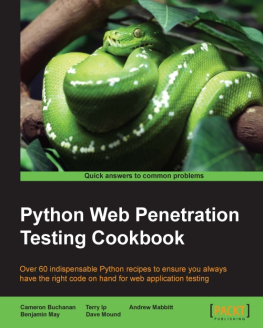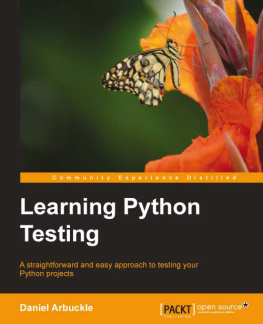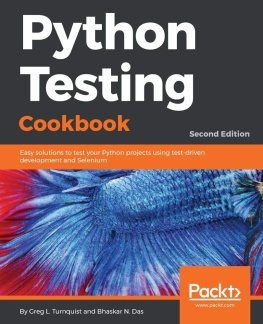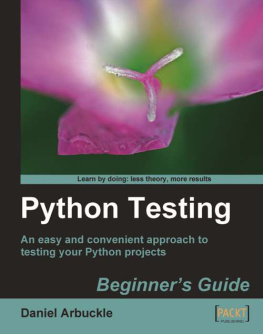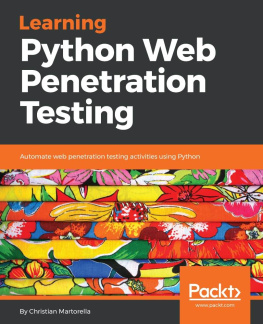Noah Gift - Testing In Python: Robust Testing For Professionals
Here you can read online Noah Gift - Testing In Python: Robust Testing For Professionals full text of the book (entire story) in english for free. Download pdf and epub, get meaning, cover and reviews about this ebook. year: 2020, publisher: Pragmatic AI Solutions, genre: Computer. Description of the work, (preface) as well as reviews are available. Best literature library LitArk.com created for fans of good reading and offers a wide selection of genres:
Romance novel
Science fiction
Adventure
Detective
Science
History
Home and family
Prose
Art
Politics
Computer
Non-fiction
Religion
Business
Children
Humor
Choose a favorite category and find really read worthwhile books. Enjoy immersion in the world of imagination, feel the emotions of the characters or learn something new for yourself, make an fascinating discovery.

- Book:Testing In Python: Robust Testing For Professionals
- Author:
- Publisher:Pragmatic AI Solutions
- Genre:
- Year:2020
- Rating:3 / 5
- Favourites:Add to favourites
- Your mark:
- 60
- 1
- 2
- 3
- 4
- 5
Testing In Python: Robust Testing For Professionals: summary, description and annotation
We offer to read an annotation, description, summary or preface (depends on what the author of the book "Testing In Python: Robust Testing For Professionals" wrote himself). If you haven't found the necessary information about the book — write in the comments, we will try to find it.
Testing In Python: Robust Testing For Professionals — read online for free the complete book (whole text) full work
Below is the text of the book, divided by pages. System saving the place of the last page read, allows you to conveniently read the book "Testing In Python: Robust Testing For Professionals" online for free, without having to search again every time where you left off. Put a bookmark, and you can go to the page where you finished reading at any time.
Font size:
Interval:
Bookmark:
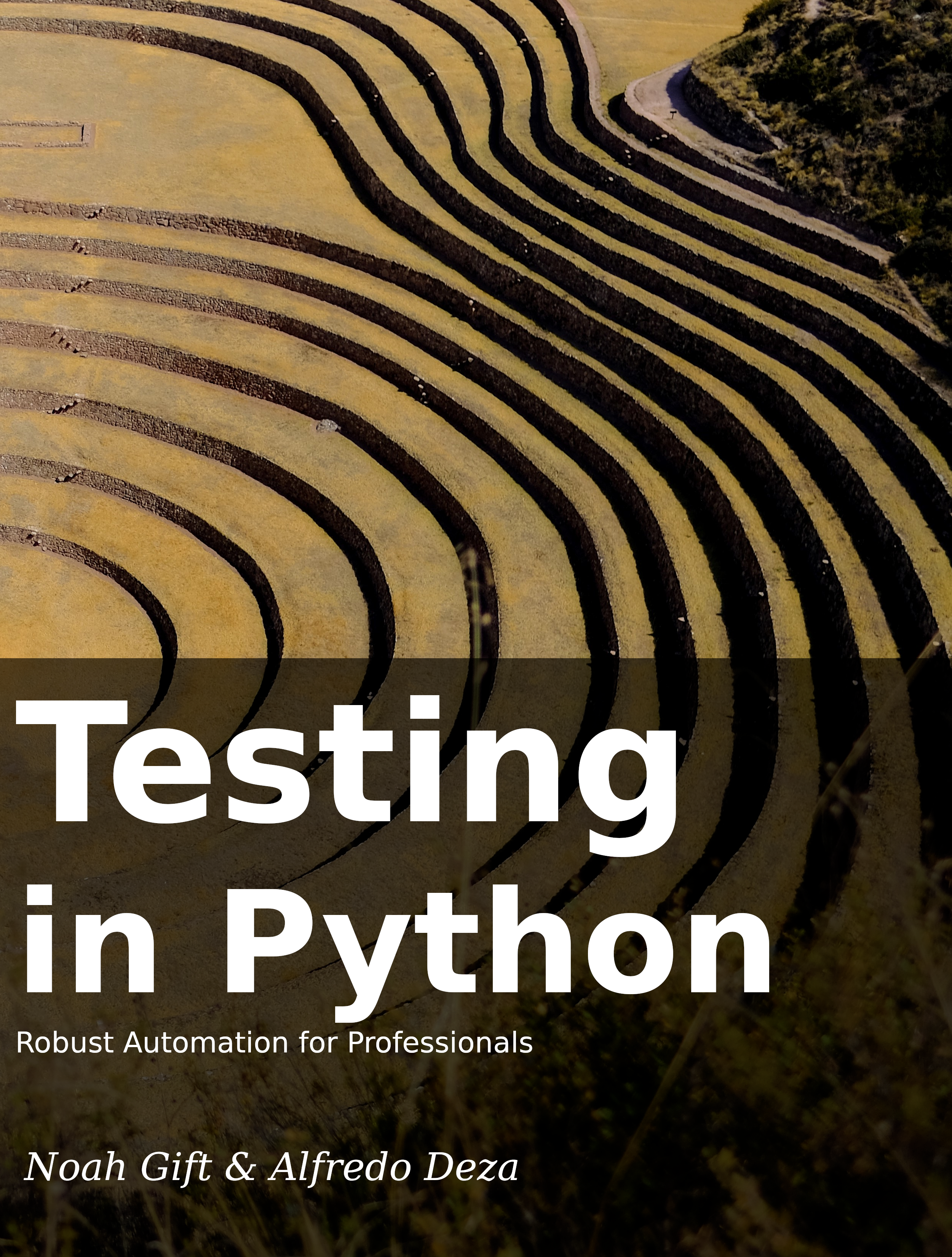
This book is for sale at http://leanpub.com/testinginpython
This version was published on 2020-02-27

* * * * *
This is a Leanpub book. Leanpub empowers authors and publishers with the Lean Publishing process. Lean Publishing is the act of publishing an in-progress ebook using lightweight tools and many iterations to get reader feedback, pivot until you have the right book and build traction once you do.
* * * * *
If you are picking up this book, it is because you want to level up the quality of the code you are producing. Regardless of the background and what type of work you are trying to achieve, testing is a prime indicator of solid software practices. From students to data scientists and programmers, testing is a core value that should be practiced, enhanced, and maintained throughout. When testing is part of a project, it means that the code is brief enough that it can easily accept inputs to ensure the outputs meet expectations. On the other hand, when it is hard, it indicates that code is fragile, and a refactoring should take place.
Testing is here to help you write better software, enhance your confidence, and make it easier to maintain.
This book is using a method called Lean Publishing, which allows us to write the book and release it before it finishes. Are you seeing that some chapters are missing? We are committed in finishing it, and keep updating it until it is done. One complete, we are going to ensure that the versions are up to date, and everything is still working.
When there are no tests, there is no way to ensure that changes arent breaking other assumptions. Applications that start small dont necessarily mean that they will stay that way; when they grow without tests, it creates a big problem: no one will want to make changes to avoid breakage. Even in the smallest applications, having some validation that things are working as expected is a good idea.
The Broken Windows Theory explains that when there are visible signs of violence or civil disorder, it encourages more crime, creating a vicious cycle. This theory also has a parallel in software. A very long function will get longer and harder to maintain. Tests are the medicine - it forces complicated code to be more granular and more comfortable to read and keep because that, in turn, makes it easier to test!
Writing tests may feel like a tedious chore, that might not give immediate satisfaction, but like most good foundations, the result is robustness and confidence. A week after touching a software project, you might not quite remember what that function was supposed to do when receiving an empty list. Changes to software are a given, and without something to confirm that everything is still working as intended, breakage will occur.
Someone once mentioned Id rather add some tests than receive a call from an angry customer . Lets not wait until customers (or users!) find out about failures that dont need to exist.
There is always a struggle between advancing a software project and (seemingly) slowing down to write tests. If you are coming from writing short snippets on an interactive shell, like Jupyter Notebooks or small scripts, this struggle will feel stronger. Throughout the process, though, you will be doing some testing regardless. For example, if you are writing a command-line tool, and you are implementing a new option, then you will probably end up in the terminal trying out that unique option to see if it does what you are expecting. The problem is that the workflow doesnt scale beyond one or two flags, and it is error-prone. The best solution is to have a good set of tests that can run almost instantly and reassure you that everything is working great.
This book works to fully support a range of Python, Pytest, and Tox versions. And we are committed to ensuring the examples work correctly with an automated test suite.
The supported versions in this book are:
- Python: Versions 3.6 and newer (including 3.8 as of this writing!)
- Pytest: Major version 5 (most examples use 5.3.2)
- Tox: Major Version 3 (most patterns use 3.14)
What you see on the cover of this book is Moray, an essential Incan site. Archeologists think this works as a testing laboratory for crops. The differences in the rings are significant enough in temperature, as well as sunlight and altitude, that the Incas could better understand ideal conditions for different crops. The analogy here is perfect; the importance of testing and ensuring things are in its optimum state, is excellent.
Noah Gift
Creating a local development environment that is simple, repeatable, and powerful is an essential first step to developing a testable software project. This technique is also a skill that translates to any future software development project.
Source control is a mandatory part of any professional software project. There are many types of version control available including subversion, mercurial and git. The most popular of these is git.
Git can be standalone, or as part of a hosted solution. Two popular solutions for hosting git projects include: Github and Gitlab.
To set up and use Github, you need a Github account and internet access. The minimal steps to start are:
1. Create a repository, for example, hello.
2. Add an SSH key to your Github account.
3. Clone the repository locally, for example:
4. Create a change and push it. This process would be an example of a good first change (inside the cloned repo).
Clone a repoecho"# hello" >> README.mdgit add README.mdgit commit -m "adding name of repo to README"git pushSurprise, the Python standard library includes a module called venv. A virtual environment solves a significant problem in Python. It isolates the Python interpreter to a specific directory. In this example, a virtual environment works in a users home directory.
To use this virtual environment, it needs to be activated.
Activate Hello World Virtual Environment in Pythonsource ~/.hello/bin/activateConventions are a powerful way to simplify complex software engineering tasks in a series of easy to remember steps. A convention-based workflow with virtual environments can also dramatically simplify using them. Here is a simple convention to use:
1. Create a virtual environment with a ~/.[reponame] format
This process removes the decision about where to put the virtual environment and what to name it. If your git repository is called hello, then you would run the following command:
Font size:
Interval:
Bookmark:
Similar books «Testing In Python: Robust Testing For Professionals»
Look at similar books to Testing In Python: Robust Testing For Professionals. We have selected literature similar in name and meaning in the hope of providing readers with more options to find new, interesting, not yet read works.
Discussion, reviews of the book Testing In Python: Robust Testing For Professionals and just readers' own opinions. Leave your comments, write what you think about the work, its meaning or the main characters. Specify what exactly you liked and what you didn't like, and why you think so.

